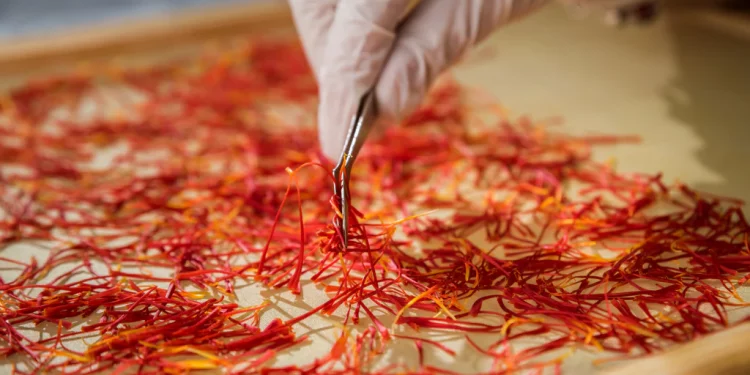Did you know that saffron, the vibrant and prized spice used in cooking, has been shown to have potential benefits for those with ADHD? As one of the most expensive spices in the world, saffron has long been known for its distinct flavor and luxurious status. However, recent research has revealed its potential for improving symptoms of ADHD, such as difficulty focusing and hyperactivity.
But before jumping to add saffron to your daily routine, it’s important to understand how and why it may work. In this post, we delve into the fascinating world of saffron for ADHD. Read on.
Table of Contents
The Roots of Saffron’s History and Influence
Saffron’s pedigree is impressive, stretching back over 4,000 years. Initially cultivated in Greece, historians believe saffron traveled along trade routes to Persia, eventually spreading to parts of:
- Asia
- North Africa
- Europe
Throughout time, it adorned palaces, added flavor to exotic dishes, and colored the robes of Buddhist monks. However, it wasn’t until recent decades that the medical community began to unveil saffron’s significant neurological and psychological effects.
Saffron as a Potential Natural Cure
Numerous studies have suggested that saffron contains compounds such as crocin and safranal. This may have properties of:
- antianxiety
- anti-depressant
- neuroprotective
This has piqued the interest of researchers looking for novel therapies. Which is beyond traditional stimulants used to treat ADHD.
Traditional Medicine Rediscovered
While Ayurveda and Traditional Chinese Medicine have employed saffron for centuries, it’s now the target of rigorous scientific scrutiny. Modern researchers have started to unlock the therapeutic potential of this ancient remedy.
This is by using technology and research methodologies. Which is unknown to the predecessors who first harnessed it.
ADHD Unpacked: A Primer on the Disorder and Its Impacts
Before we explore the potential of saffron, it’s crucial to understand the condition it aims to address. ADHD is a complex neurodevelopmental disorder that affects both children and adults. It is characterized by:
- inattention
- hyperactivity
- impulsivity
There are three main subtypes of ADHD, and the condition can have a profound impact on one’s life. These including:
- educational attainment
- job performance
- social relationships
Navigating the Spectrum of Symptoms
ADHD symptoms can manifest differently in individuals. This leads to unique expressions of the disorder’s challenges.
Understanding and recognizing these symptoms is the first step toward effective management. This includes treatment of ADHD.
Challenges in Diagnosis and Management
Diagnosing ADHD is not a simple task. It requires a comprehensive evaluation that considers a range of factors. This could be from genetic predispositions to environmental influences.
Coupled with this complexity is the challenge of tailoring a management plan. Which could effectively address the unique needs of each patient.
The Saffron-ADHD Connection: What Research Tells Us
A growing body of evidence suggests that saffron may hold promise in the treatment of ADHD. Several studies support the notion that saffron could alleviate symptoms of:
- inattention
- hyperactivity
- impulsivity
This is with fewer side effects than conventional medications. While these preliminary findings are encouraging, further research is needed to confirm saffron’s efficacy. This includes its safety profile for individuals with ADHD.
Saffron’s Effects on Dopamine Pathways
Dopamine is a neurotransmitter associated with the brain’s reward system. The imbalances in its levels are linked to ADHD.
Some studies indicate that saffron might modulate dopamine pathways. It potentially leads to improved attention and impulsivity control.
Balancing Act: Saffron and Serotonin
Serotonin is another crucial neurotransmitter that’s been implicated in ADHD. Saffron’s ability to influence serotonin levels could offer a multifaceted approach to managing ADHD. This includes it’s:
- symptoms
- targeting mood
- impulse control
- and more
Clinical Trials and Human Studies
Emergent clinical trials have provided insights into the potential benefits of saffron for ADHD patients. These studies employ standardized saffron extracts.
This is to maintain consistency in dosing and the presence of active compounds. This promotes the scientific rigor required to assess saffron’s true impact.
Safety First: Saffron and Considerations for Use
While saffron shows promise, its use should be approached with caution. Like any intervention, saffron could interact with other medications. This is especially those with medicinal properties.
It should not replace those prescribed by a healthcare professional without consultation. The side effects are generally mild. This is the most common being gastrointestinal distress.
However high doses might lead to sedation and altered consciousness. As a potent colorant, saffron may stain surfaces and skin. It also includes allergic reactions that are possible, although rare.
Understanding Medication Interactions
It’s essential to be aware of potential interactions between saffron and other supplements or medications. Saffron may enhance the effects of other Central Nervous System (CNS) acting compounds. So anyone considering adding saffron to their regimen should do so under medical supervision.
The Impact on Certain Medical Conditions
Individuals with bleeding disorders and those taking anticoagulants should take particular care with saffron. This is because It may inhibit platelets’ function.
High doses could lower blood pressure. So those with hypotension or who are on blood pressure-lowering medications should be vigilant.
Incorporating Saffron Into Your ADHD Management Plan
For individuals keen on exploring saffron as part of their ADHD management, a methodical approach is advised. Begin by consulting with a healthcare provider who can advise on dosing. Which could also monitor for any adverse effects.
High-quality saffron supplements or standardized extracts are the preferred form. This is with dosages ranging from 15 mg to 100 mg. It also depends on the extract’s strength and the active compound concentration.
The Importance of Quality and Standardization
Not all saffron products are created equal. Look for supplements that detail the concentration of active compounds. Also, ensure they are free from contaminants.
The cultivation and processing of saffron affect its potency. So opt for products from reputable manufacturers. This makes sure that you get Saffron Natural Mental Health Solutions.
Complementary Approaches and Lifestyle Changes
While saffron may offer a natural complement to existing treatments, a holistic approach can enhance the overall management of ADHD. These include:
- dietary modifications
- exercise
- other supportive therapies
Each incremental change should be monitored for its effect on symptoms and well-being. This provides valuable feedback for continued adjustments.
Embrace the Benefits of Saffron for ADHD
In conclusion, saffron is a valuable and natural option for managing ADHD symptoms. Its numerous benefits have been supported by research. This makes it a promising alternative for those seeking a more holistic approach to their treatment.
However, I encourage you to consult with a healthcare professional before incorporating saffron into your routine. Take the first step towards a more balanced life. Discuss the potential benefits of saffron for ADHD today.
If you want to read more articles, visit our blog.


 Home
Home









